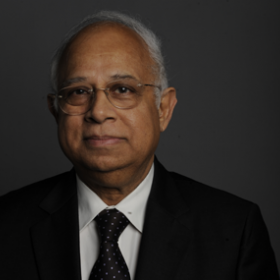
Furthering Democracy
Writing for Pakistan's Daily Times, EWI Board Member Ikram Sehgal discusses Pakistan's internal political challenges and obstacles.
Does one need Sherlock Holmes to deduce that the nasty and misleading story aired by a foreign news agency about a “split” in the army originated from a partisan source?
Most politicians can be economical with the truth even at the best times. With Khursheed Shah critiquing in the joint session of parliament the prime minister buckling under pressure from the army and the resultant threat to democracy, Mian sahib crossed the failsafe line that an awakened public is now increasingly not likely to tolerate between truth and falsehood. “Sotto voce” a solemn-faced prime minister categorically denied requesting the army for mediation to defuse the political standoff and assured the house about upholding the joint parliamentary resolution supporting the Constitution in letter and spirit.
Recall his struggle along with the late Benazir Bhutto: “Governments come and go but principles cannot be sacrificed.” Describing the opposition leader’s speech as reflecting his sentiments he said, “How can one expect a U-turn from me, who endured the hardships of arrest and exile for the cause of democracy?” The prime minister’s recollection of sequence of events was that after he was telephonically informed in Lahore in the presence of Interior Minister Chaudhry Nisar Ali Khan about the PTI and PAT leaders’ request to meet General Raheel Sharif, he did not object. “If they want to meet the army chief then they should certainly meet. The army did not ask to play the role of mediator, neither have we requested them to play such a role.” This confirmed that the army had been specifically instructed by the government to step in. The Inter-Services Public Relations (ISPR) flatly contradicted Mian Nawaz Sharif’s statement.
The two dharna (sit-in) leaders vehemently denied requesting the army to broker a settlement, insisting that the prime minister was blatantly telling lies to parliament. Referring to the Director General ISPR, Major General Asim Bajwa’s Twitter update “(The army chief) was asked by the government to play a facilitative role for resolution of the current impasse, in yesterday’s meeting, at (Sharif’s) house” as proof, Maulana Tahirul Qadri said, “The request to resolve this issue as mediator came from the prime minister and incumbent government.” Following the public denouement of Nawaz Sharif’s credibility, a three-member bench of the Supreme Court (SC) admitted a petition seeking the prime minister’s disqualification for telling lies to parliament. Declaring that the ‘who said what’ was between the prime minister and the Chief of Army Staff (COAS), the SC bench put the credibility of at least one of them on the line. Prima facie, the facts are pretty open and shut; does one really expect anyone to fall over themselves to deliver justice?
Nawaz Sharif whispering “Geo, Geo” on primetime television, attempting to prompt the federal interior minister during the joint session of parliament was really uncalled for. That stage whisper seen and heard by millions fully exposed Information Minister Pervez Rasheed’s remark to the media: “Now you know which side we are on,” after the Sharif visit to Hamid Mir’s bedside. Given the innuendos and accusations about scriptwriting from the ‘democrats’ in and out of the house (and disparate television anchors), the military has been forced to repeatedly ‘clarify’ they were “not siding with anyone”. Being reactive instead of being proactive, appeasing detractors on the one hand and on the other taking friends for granted, or even ignoring them altogether, no wonder they end up on the receiving end. Munich, 1938, is a historic precedent that appeasement is always counter-productive. Appeasement should have ceased after the wake-up call rendered by the Hamid Mir affair. Does one need Sherlock Holmes to deduce that the nasty and misleading story aired by a foreign news agency about a “split” in the army originated from a partisan source?
These sideshows unfortunately detract from the change that the people of Pakistan want (and deserve). Imran Khan must get his priorities right: redemption for the electoral deviations suffered by his party or the struggle to change the destiny of the people? Fixing the electoral system being the primary objective, those planning and executing strategy need boning up on Clausewitz’s first principle of war, the “selection and maintenance of aim”. Demanding a judicial commission for the 2013 elections diverts from the selected aim. Consigned invariably to the dustbin of history, which commission’s report has ever achieved anything in Pakistan? A legal passage to nowhere geared to derail aspirations for a free and fair electoral process, the suggested terms of reference (TORs) were tailor-made for filibuster. Imran is playing into the hands of feudals comprising the majority in parliament. Look at their influence in preventing the local bodies elections. The fountainhead of democracy is local governance; without it democracy is a farce.
Freedom from the evils associated with the present democratic bondage should be the greatest gift for the poverty-stricken and discriminated populace of this country. Feudalism and democracy cannot coexist. Is this the moment where history will record that democracy finally got the better of feudalism in Pakistan? Deviating from the selected aim will render us an unfortunate footnote to history. It will simply pass us by.
Do not hold your breath about getting justice from those responsible to render it or enforce it. Lack of an honest agenda, the arcane laws of evidence and a battery of glib lawyers will likely give legal sanction to ‘our constitutional duty to tell lies on (and off) the floor of the house’. To serve and further the cause of democracy — that should be an ideal follow-up resolution of the joint session of parliament.

